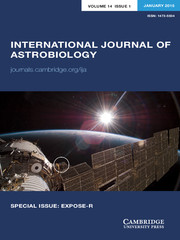Article contents
Photochemical stability of biomolecules in the experiments modelling Martian surface conditions
Published online by Cambridge University Press: 08 September 2005
Abstract
Life has probably existed on Earth for about 3.5 billion years and ever since people could wonder, they have tried to understand its origins. It is thought that organisms as complex as bacteria emerged within 0.5–1 billion years. Organic molecules, such as amino acids, organic acids and sugars have been observed in material from extraterrestrial sources in the solar system. But, to confirm the possibility of nucleic acid bases also being synthesized under these conditions, we have replicated the synthesis of monophosphates as dry pellets (5′-monophosphates, the predominant reaction products) under simulated Martian conditions. Our research task was to find out whether the main organic substances were able to survive in the absence of water. This reaction must proceed under solvent-free conditions and incident short ultraviolet radiation (UVC) in a vacuum. After 5 months of reaction time monophosphates could be identified in detectable quantities. These experiments utilized basalt and limonite as protectors and successfully shielded the products from decomposition by UVC. Our team has obtained more results concerning prebiotic synthesis of polypeptides and nucleotides in the presence of meteorite dust; these are the same kind of experiment, but using different extraterrestrial material.
Keywords
- Type
- Research Article
- Information
- Copyright
- 2005 Cambridge University Press
- 5
- Cited by


